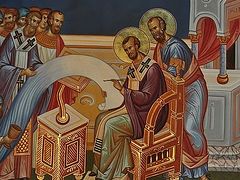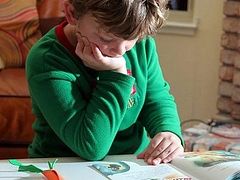There are some teachers of literature whose teaching instantly draws you to study Pushkin and Dostoyevsky’s works in-depth, and, more than that, to come to church for a visit and become a churched believer. Nikolai Lobastov, who has such an amazing talent, is an experienced teacher and the author of A Rural Teacher’s Notebook. Our guest spoke about his experience of inspiring students to study Russian classical literature and helping them discover the Orthodox faith.
About our guest: Nikolai Lobastov is a teacher, writer, and a graduate of St. Tikhon’s Orthodox University. In his book, A Rural Teacher’s Notebook, he speaks about Russian literature and Christianity. He resides in the town of Lyskovo, Nizhny Novgorod Region.
—Nikolai Alekseevich, when you tell teenagers about Russian classical literature, what is their reaction?
I enjoy the lessons I have with high school students. They have an open and truly receptive nature. They are actively searching for truth, just as they are concerned with the problems of love and death. It will always be like that at all times. Teenagers ask tough questions, they listen and willingly join the discussions. I like it when there is a dialogue. There is one particular feature in my teaching style. I discuss the Russian classics through the Gospels and the Orthodox faith, just as I tell my students about the writers’ spiritual quest or how the issue of religion was expressed in their works.
Yesenin wrote these wonderful lines: “The soul feels sorrow for the heavens, for it’s a stranger in these lands.” Pushkin has expressed the thought differently: “Genius should aspire to reach the skies.” This yearning for perfection was the reason why Russian writers were drawn to write. Once you touch on these ideas, your audience will react with enthusiasm.
—Still, we often hear that our children are not interested in reading or learning about Eugene Onegin1…
—Christ is One and the Same today, tomorrow, and forever. He is the measure of things. Eternal values are the same at all times. The painful and bleeding questions that classical literature touches upon will remain unsolved until the end of time. The teacher’s job is to understand from what angle the heroes of Pushkin and Lermontov should be analyzed and where he is to place emphasis. During Soviet times, any main character, be it Onegin or Pechorin, was made a revolutionary of sorts, and the most advanced among students were really bored. If you introduce Onegin and Pechorin as the bored sophisticates of the aristocracy, it won’t leave anyone excited. It is a shame if the teaching of classics does not incorporate the hot topics of today’s life. When the teacher assists his students in resolving vital questions, it will result in a much more exciting experience.
How can we discuss the characters from the classics? Eugene Onegin preaches hedonism and freethinking; he needs nothing and cares about no one. “Enjoy life to the fullest,” as we would say today. At the same time, he is incredibly bored, suffering from “existential melancholy.” It is somewhat similar to the Western path of individual development where man creates a cult of freedom and puts himself in the center of the universe. Tatiana, to the contrary, “with her Russian soul,” personifies traditional values and adherence to the Divine commandments. She lives in harmony with her conscience, and duty is more important for her than passions.
—What interesting details can you share about Pushkin, and how would you describe his religious sentiment?
Let’s look at the following detail from the poet’s biography. Pushkin arrived at his exile in Mikhailovskoye in 1824. He resided there for two years in company with his elderly nanny. Beginning from 1825, Pushkin no longer writes parodies on religious matters and abandons his former passions of Voltairism and Byronism. He writes to his friends: “There is nothing wiser than staying at your country estate and watering a cabbage patch.” The capital city’s sinful passions, such as cards, society gossip, or wine no longer excite him. One can say that village life has transformed him. He is surrounded by Russian-speaking people; he learns to honor the traditions of his ancestors. He becomes interested in Svyatogorsky monastery, the pilgrims, Abbot Jonah, reading the Bible and the holy fathers. All of these activities illuminate the soul. Pushkin sent a request to a priest, his acquaintance, to serve the Eucharist for the commemoration of the faithful departed for Byron.2 While in Mikhailovskoye, he composes his famous poem, “The Prophet”, which refers to the biblical story of Prophet Isaiah’s vision of seraphim in “We’re mired by thirst for sacred things.” Pushkin skillfully expresses the idea of how God grants the gift of prophecy to His elect so that they can deliver His will to mankind.
What a poignant character of Monk Pimen has Pushkin presented in his drama, “Boris Godunov”, which was also written during his exile in Mikhailovskoye! Pushkin’s main character, as an elder and chronicler, admits that “once God delivered him to the monastery,” he found blessedness. Pimen, by the author’s plan, is the essence of such Christian virtues as piety, meekness, wisdom, and diligence. The teacher may subtly place special emphasis on him to spark children’s interest in learning more about Christianity.
School children of today are characterized by the so-called iGen mentality. They are used to receiving everything in a concise and attractively packaged way. The teacher should be capable of keeping them focused and fascinated by talking about the most relevant things, using colorful details and memorable examples.
—What do you think about online learning?
—It is the end product of a pragmatic approach where man is perceived as a consumer or a tiny cog in a giant wheel. It creates an idea that education is a commodity, just as is the intellect and the competencies. When education is judged based on its marketability then online learning is a convenient tool. However, education is not only the transfer of knowledge from teacher to student. The teacher’s personality, intonation, gestures, and eye expression are just as important in the learning process. You know, it is akin to taking a seat next to a holy man. No words needed, just one look at him and you get an intuitive understanding of the most valuable things.
If liberal ideology prevails in education, online learning will score a victory. It has proven its convenience for both the government and the economy. At the same time, the notion of individuality will become obsolete and irrelevant.
—What books about family values can you recommend?
Certainly, it would be Captain’s Daughter, Pushkin’s short novel with a skillful depiction of Masha Mironova’s family, love, and the faithfulness of her parents to one another. Another one that comes to mind is Goncharov’s The Precipice. The character of Granny is wonderful there— her relationship with her grandchildren. This book sets priorities straight when it comes to building a family. Turgenev’s depiction of the older Bazarovs is excellent. Despite their somewhat incidental appearance in the novel, they were poignantly portrayed as a truly devoted couple. Turgenev as an ingenious master of the pen masterfully depicted their love towards their son as well to one another. However, it is hardly possible for us to imagine nihilist Bazarov as a family man, much less cradling a baby. Vasily Rozanov wrote about it. “The progressives” of the nineteenth century no longer considered the family as a valuable asset. In the second half of the nineteenth century, the most coveted topic of literary discussion was about lust being greater than marriage. Every writer, beginning with Turgenev, wrote about it. Think of Anna Karenina from Tolstoy’s novel or Ekaterina Kabanova from Ostrovsky’s play. Or, we can look at the writers of the so-called Silver Age, or Alexander Blok and his poetry. Every new collection of poems he had published was dedicated to a new love interest. The writers of this type looked for inspiration in passions. They thought, family life with the mother-in-law and five children under one roof—what was there to write about?!
Dostoevsky, on the other hand, once life had chastened him, was able to combine literary success with happy family life. A lot of Slavophiles were able to combine both as well. Aksakov, Khomyakov, or Kireevsky were known to have had admirable families.
During Soviet times, the writers could not place such a strong emphasis on passions in their works as marriage was now called “the nucleus of society.” It so happened that Soviet literature, with the countryside writers in particular, brought the issue of family back into focus.
—How did you become a Christian?
—My grandmother was a woman of faith and prayed for all of us. In the Soviet times, she used to host the Orthodox faithful in her home, and I remember how they sang the church hymns. The local authorities tried to prohibit such gatherings. But my grandmother said: “I am not going to listen to anyone.” So, she never paid attention to anyone and celebrated all major church feasts at her home. When I was around ten or twelve years old, she gave me the Gospels to read. Later, as I was growing up, everything that had to do with my grandmother was pushed to the sideline. I grew up during the 1970s known for the prevailing policy of state atheism. It was a time when I neither saw a priest nor opened the Bible. Then, perestroika came and it sent us all reeling. That is when I asked the ultimate question: What do we live for? If there is no communism, what can we expect in the future? You find the answers once you start asking the questions. Literature, my favorite subject at school, helped me to ask those questions. My favorite schoolteacher was Lira Mikhailovna, and she was the literature teacher, of course.
—Is it the search for the meaning of life that brought you to Church?
—Well, somehow I kept searching intellectually. I begen to read a lot of books. I used to go shopping to our major local city of Nizhny Novgorod where I’d buy the Orthodox and philosophy books and then gobble them up. Later on, a wonderful priest from Moscow was appointed to serve at our village church in Prosek. As one of spiritual children of Father Mikhail Trukhanov, Fr. Vladimir Antipin became a rector of the local St. Nicholas the Wonderworker Church. Our priest had started as an altar attendant at the famous Vagankovskoye Cemetery church, working at the same time as a teacher of Descriptive Geometry at Moscow’s Forest Engineering Institute. He then made a conscious decision to leave Moscow for the provinces. He is a highly educated man. Had I not had his helping hand and teaching, there’d be no “A Rural Teacher’s Notebook.” He lives simply, like an ascetic. He is over eighty years old these days and I have been his spiritual son for the last quarter of a century.
—What was the most important instruction you received from your spiritual father at the beginning of your life at church?
—Father told me: Every Sunday is for the church.
I’ve had Fr. Vladimir Antipin as my spiritual father for a quarter of a century. Father told me right away: You should be at church every Sunday!
You may stay home but only if you are bedridden. And, for the last 15 years or so, there wouldn’t be a single Sunday liturgy that I missed. We have a strict priest. God commanded us to observe the Lord’s Day. My life at church was the reason why “A Rural Teacher’s Notebook” turned out to have such an austere Orthodox viewpoint. I owe it also to Fr. Vladimir Antipin, our champion of asceticism.
—There are people who are baptized yet they stay away from the church. Why?
—I think the main reason is that we crave the comfort of life. On the one hand, we want everyone to come to church. We know from the Gospels that the Lord fed five thousand people with a few loaves, but where did those crowds go next? They witnessed such miracles! But somehow there was practically no one left with the Lord on Golgotha.
A lot of people can complain of having a lack of time these days and how busy they are as in, “I do want to come to church but I just don’t have time for it”. People are tempted differently at various times. Comfort is today’s major temptation. If you live well, you will be in no hurry to come to church. My former students often visit me and ask: “Well, sure, I must go to church. I have been thinking about it for a while. But my life has gotten so busy. Construction, business, work…” We make our own choices, whereas God expects everyone to come to Him.
—A new school year is about to begin, how do you feel about it?
—I prefer to look back and reflect on my own experiences at school. We yearned to enjoy friendships once more, as we hadn’t seen our school friends for the whole summer. September 1 is a holiday remembered for the girls’ white aprons, the flowers brought to teachers, the happy faces, and the love we all shared. Life moves forward, so there are some new traditions and then some that we have already lost. The kids talk less and less as they are preoccupied with their gadgets.
I’d like to wish that the development of effective teaching practices of our national pedagogics continued. We trusted our wonderful teachers. We walked hand in hand with them in our lives. I don’t know who taught whom better, they or us. It was as if we were together on a ship sailing along the sea of life. The teacher shouldn’t be turned into a manager but instead, remain a mentor and an older companion in learning.
—What is the distinguishing characteristic of a modern child?
A child of today can easily switch back and forth between a teacher and his friends, or the Internet. If he doesn’t like something, he can instantly modify his online contacts. It is so detrimental to us as humans. We cannot exist in chaos and disorder. We live next to our loved ones and we take time to know them. This way, we learn to understand ourselves better. It is very good for us to hang around other people and rub shoulders with them as one team, be it at school, university, or at work.





